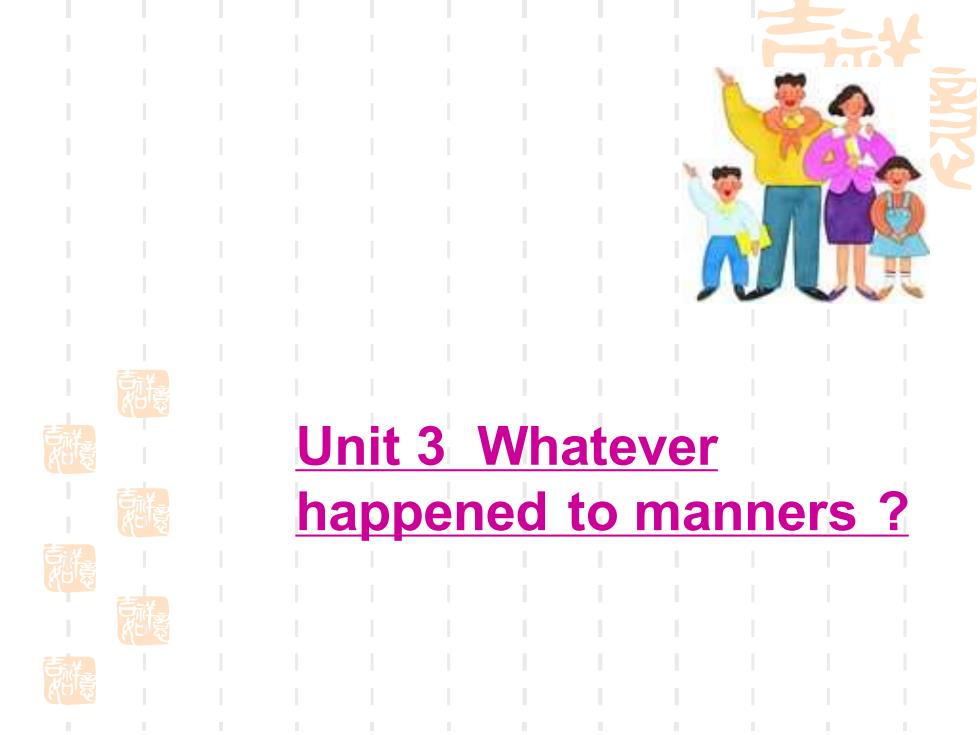
Unit 3 Whatever happened to manners
Unit 3 Whatever happened to manners ?
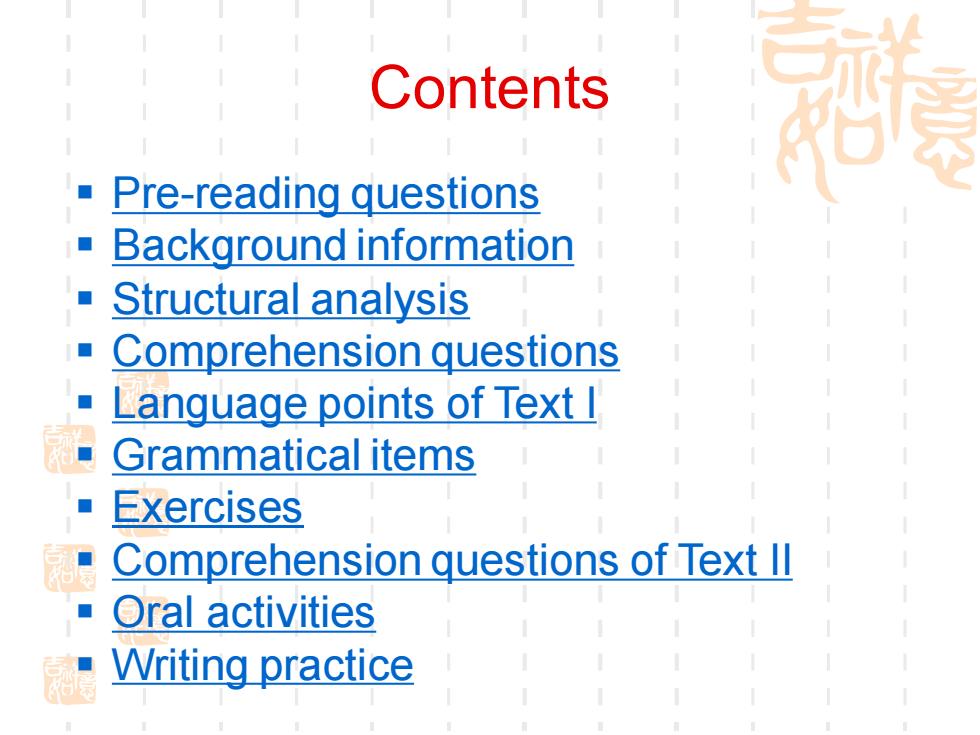
Contents Pre-reading questions Background information ■Structural analysis Comprehension questions Language points of Text I Grammatical items Exercises ■ Comprehension questions of Text ll Oral activities Writing practice
Contents ▪ Pre-reading questions ▪ Background information ▪ Structural analysis ▪ Comprehension questions ▪ Language points of Text I ▪ Grammatical items ▪ Exercises ▪ Comprehension questions of Text II ▪ Oral activities ▪ Writing practice
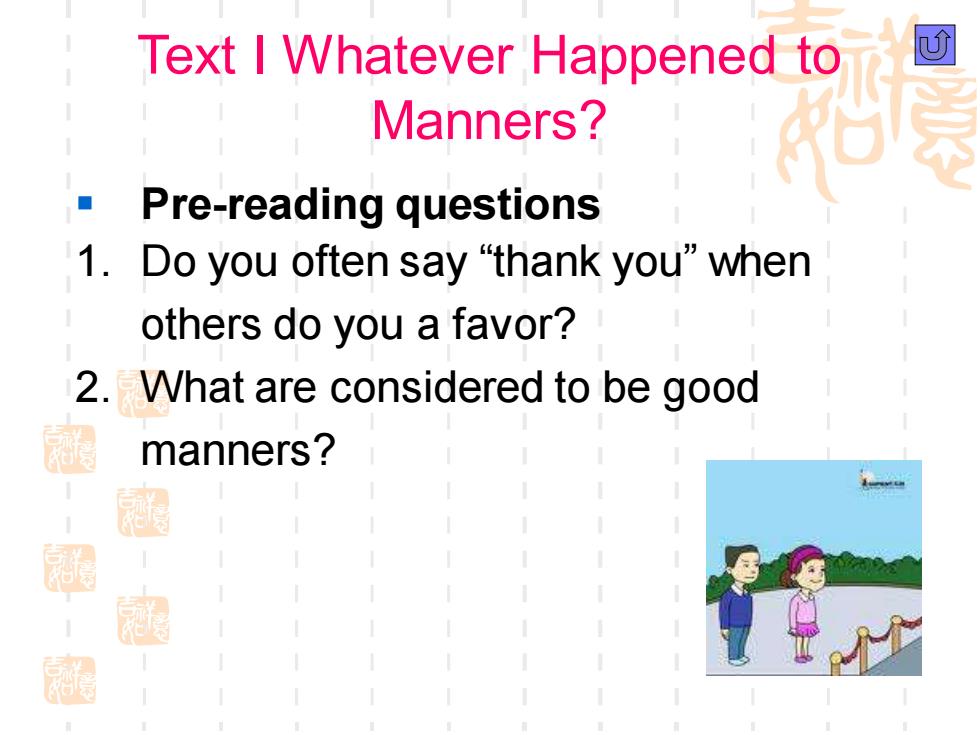
Text I Whatever Happened to Manners? Pre-reading questions 1.Do you often say "thank you"when others do you a favor? 2.What are considered to be good 阔 manners? 刷 超
Text I Whatever Happened to Manners? ▪ Pre-reading questions 1. Do you often say “thank you” when others do you a favor? 2. What are considered to be good manners?
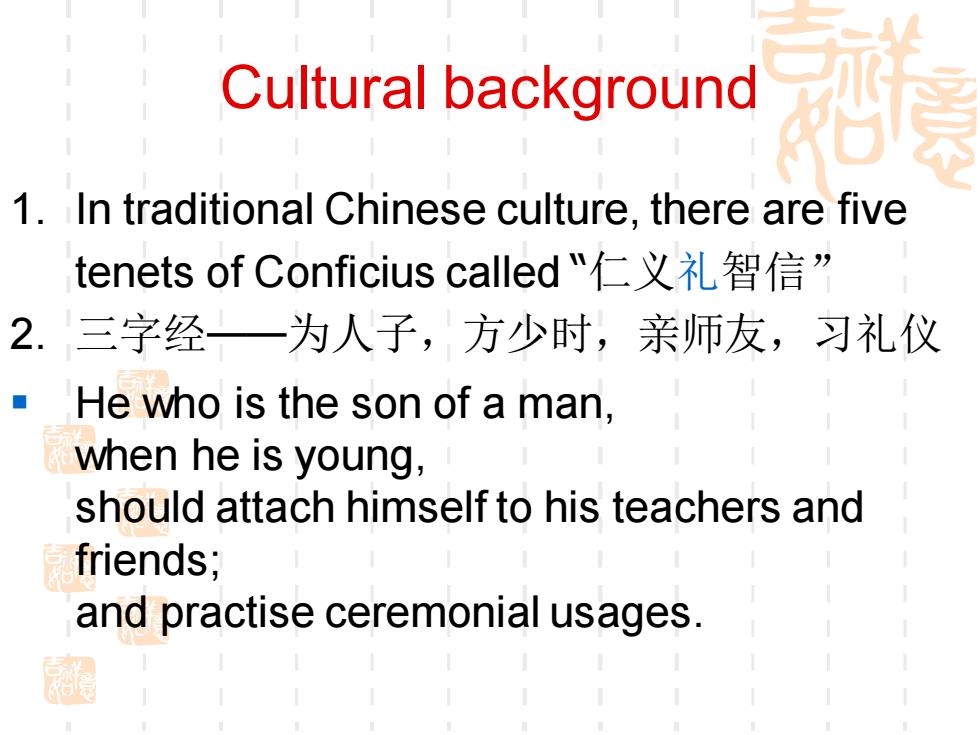
Cultural background 1.In traditional Chinese culture,there are five tenets of Conficius called"仁义礼智信” 2.三字经一为人子,方少时,亲师友,习礼仪 He who is the son of a man, when he is young, should attach himself to his teachers and friends; and practise ceremonial usages. 密
Cultural background 1. In traditional Chinese culture, there are five tenets of Conficius called “仁义礼智信” 2. 三字经——为人子,方少时,亲师友,习礼仪 ▪ He who is the son of a man, when he is young, should attach himself to his teachers and friends; and practise ceremonial usages

Table manners(1) 1)The Soup Course Dinner usually begins with soup.The largest spoon at your place is the soup spoon.It will be beside your plate at the right-hand side. ■2)The Fish Course -If there is a fish course,it will probably follow the soup.There may be a special fork for the fish,or it may be similar to the meat fork. Often it is smaller. 密
Table manners(1) ▪ 1) The Soup Course ▪ Dinner usually begins with soup. The largest spoon at your place is the soup spoon. It will be beside your plate at the right-hand side. ▪ 2) The Fish Course ▪ If there is a fish course, it will probably follow the soup. There may be a special fork for the fish, or it may be similar to the meat fork. Often it is smaller
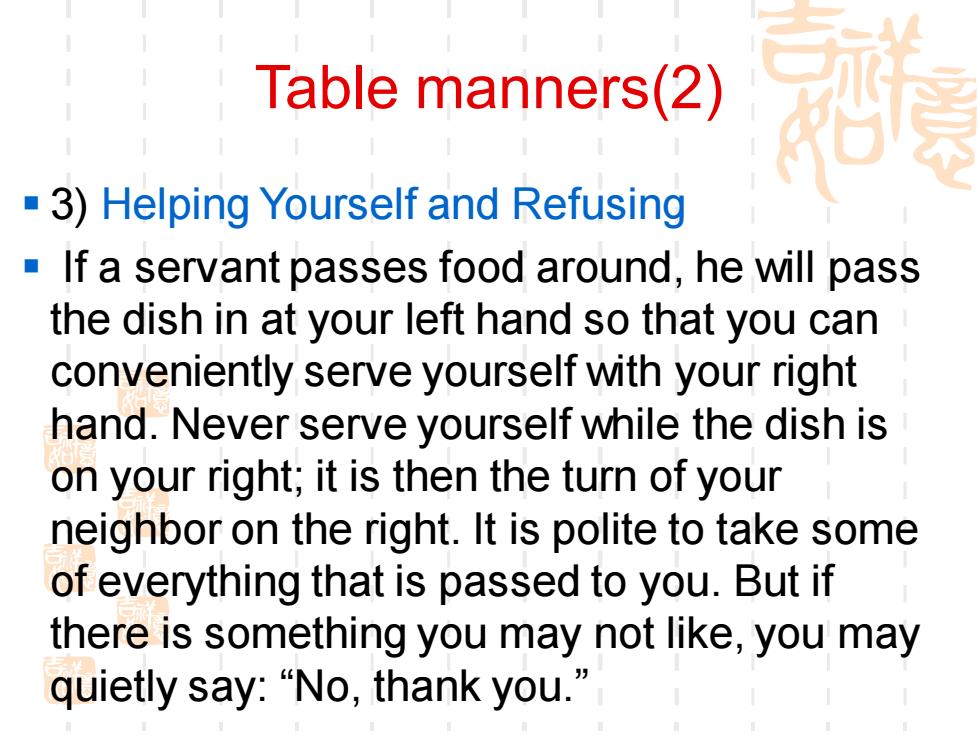
Table manners(2) -3)Helping Yourself and Refusing If a servant passes food around,he will pass the dish in at your left hand so that you can conveniently serve yourself with your right hand.Never serve yourself while the dish is on your right;it is then the turn of your neighbor on the right.It is polite to take some of everything that is passed to you.But if there is something you may not like,you may quietly say:“No,thank you
Table manners(2) ▪ 3) Helping Yourself and Refusing ▪ If a servant passes food around, he will pass the dish in at your left hand so that you can conveniently serve yourself with your right hand. Never serve yourself while the dish is on your right; it is then the turn of your neighbor on the right. It is polite to take some of everything that is passed to you. But if there is something you may not like, you may quietly say: “No, thank you
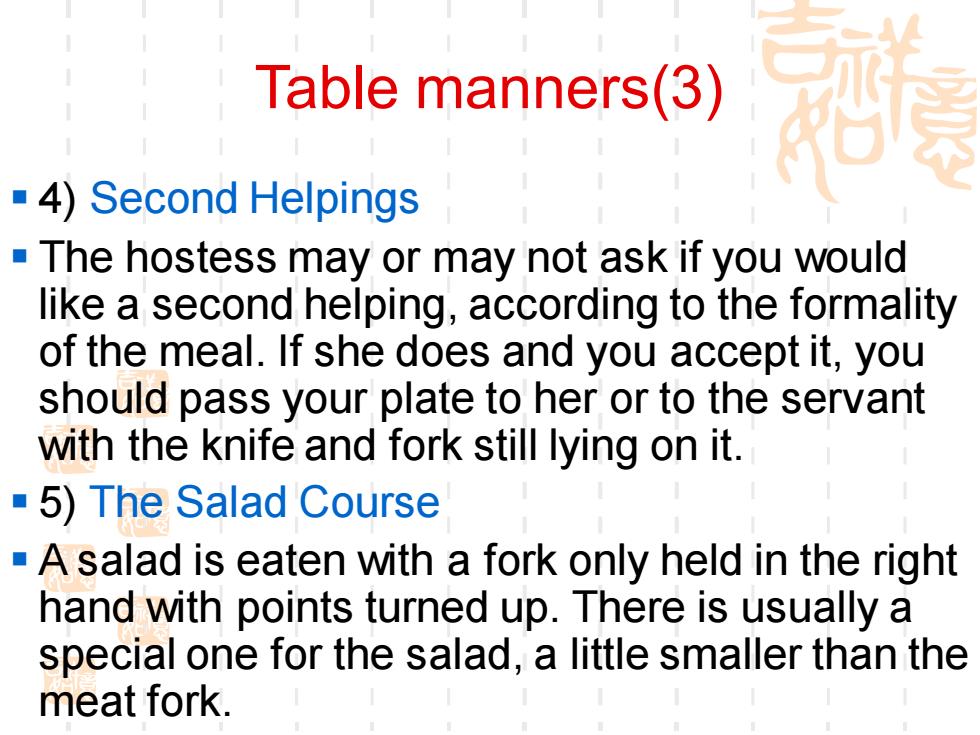
Table manners(3) 4)Second Helpings The hostess may or may not ask if you would like a second helping,according to the formality of the meal.If she does and you accept it,you should pass your plate to her or to the servant with the knife and fork still lying on it. -5)The Salad Course -A salad is eaten with a fork only held in the right hand with points turned up.There is usually a special one for the salad,a little smaller than the meat fork
Table manners(3) ▪ 4) Second Helpings ▪ The hostess may or may not ask if you would like a second helping, according to the formality of the meal. If she does and you accept it, you should pass your plate to her or to the servant with the knife and fork still lying on it. ▪ 5) The Salad Course ▪ A salad is eaten with a fork only held in the right hand with points turned up. There is usually a special one for the salad, a little smaller than the meat fork
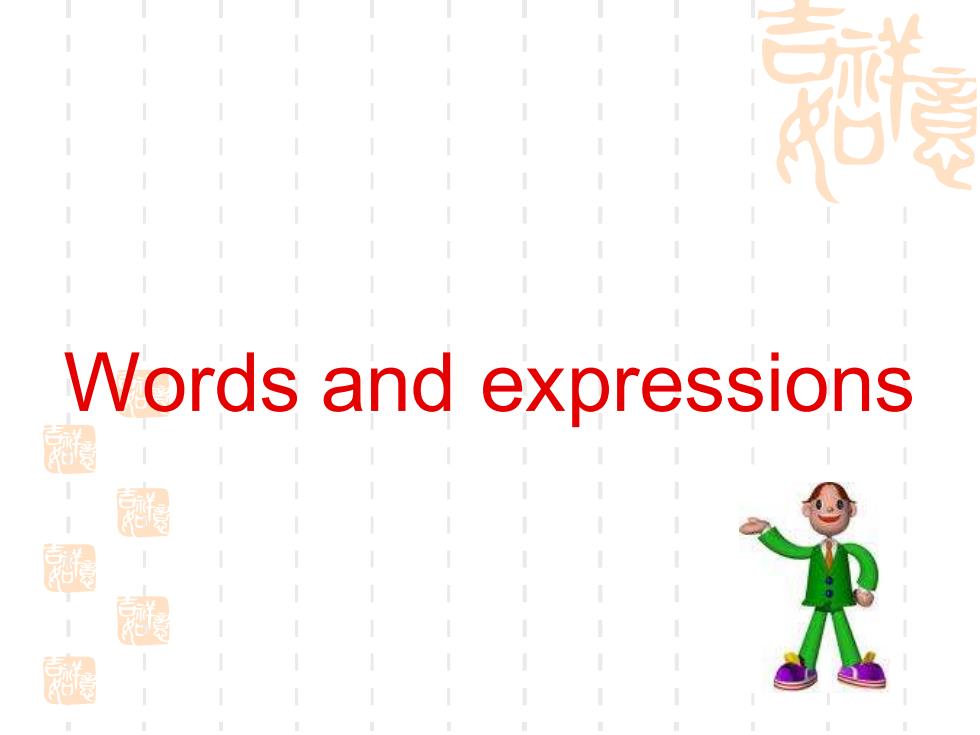
Words and expressions 郎龍
Words and expressions
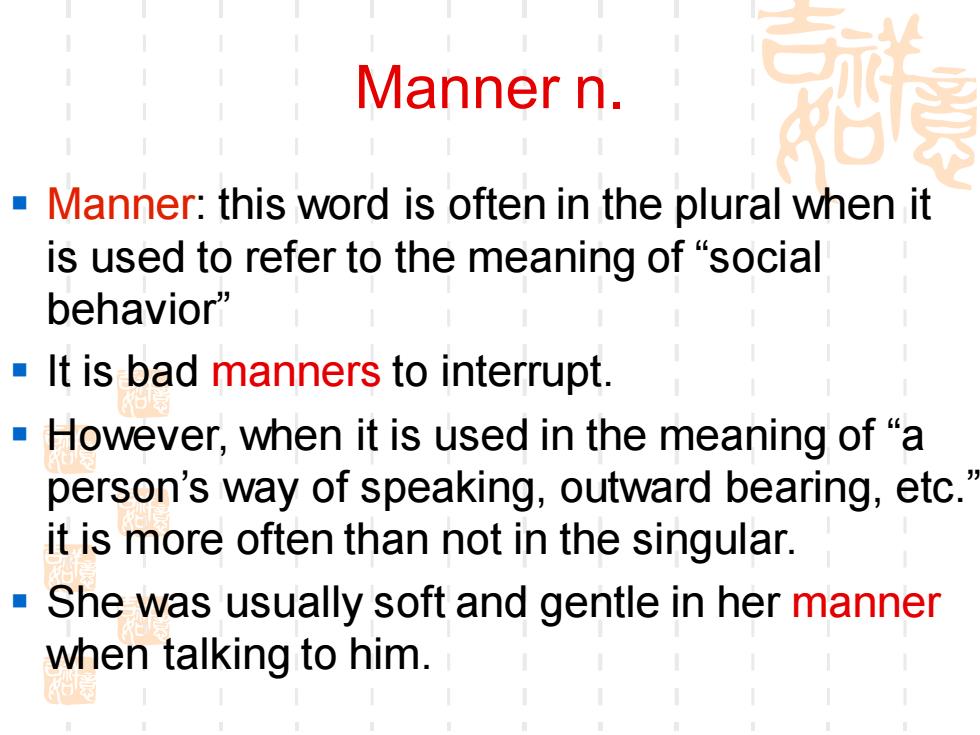
Manner n. Manner:this word is often in the plural when it is used to refer to the meaning of "social behavior" It is bad manners to interrupt. However,when it is used in the meaning of "a person's way of speaking,outward bearing,etc. it is more often than not in the singular. She was usually soft and gentle in her manner when talking to him
Manner n. ▪ Manner: this word is often in the plural when it is used to refer to the meaning of “social behavior” ▪ It is bad manners to interrupt. ▪ However, when it is used in the meaning of “a person’s way of speaking, outward bearing, etc.” it is more often than not in the singular. ▪ She was usually soft and gentle in her manner when talking to him
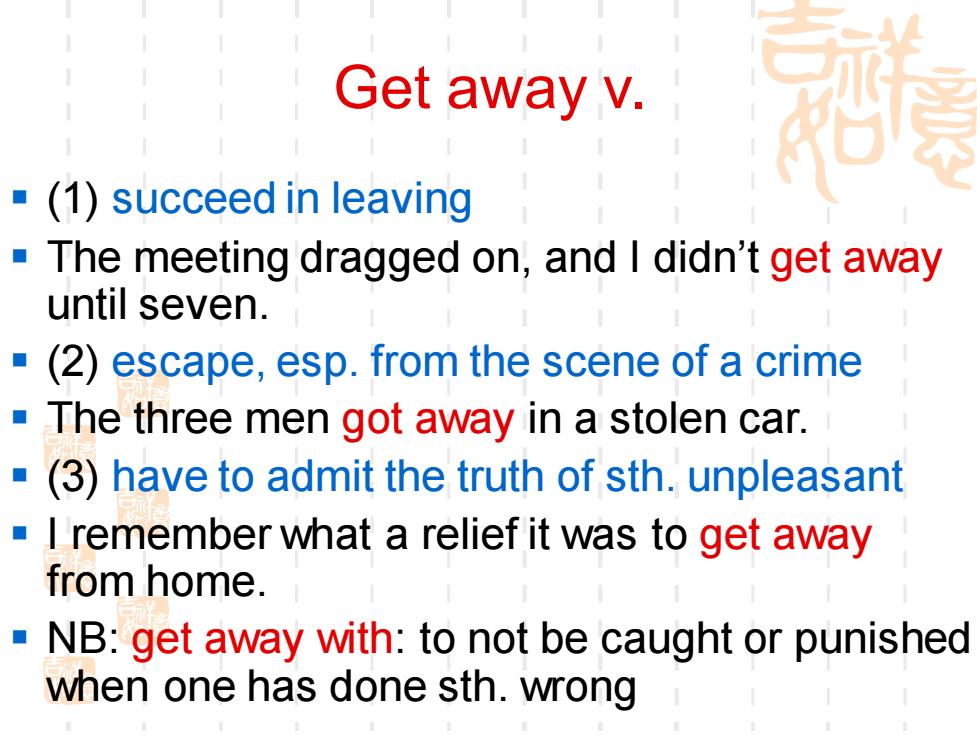
Get away v. (1)succeed in leaving The meeting dragged on,and I didn't get away until seven. (2)escape,esp.from the scene of a crime -The three men got away in a stolen car. (3)have to admit the truth of sth.unpleasant -I remember what a relief it was to get away from home. NB:get away with:to not be caught or punished when one has done sth.wrong
Get away v. ▪ (1) succeed in leaving ▪ The meeting dragged on, and I didn’t get away until seven. ▪ (2) escape, esp. from the scene of a crime ▪ The three men got away in a stolen car. ▪ (3) have to admit the truth of sth. unpleasant ▪ I remember what a relief it was to get away from home. ▪ NB: get away with: to not be caught or punished when one has done sth. wrong